Abalone Poaching
- Richprins
- Committee Member
- Posts: 76104
- Joined: Sat May 19, 2012 3:52 pm
- Location: NELSPRUIT
- Contact:
Re: Abalone Poaching
Gas bottle blast leads to bust of illegal abalone operation in Stellenbosch
By TimesLIVE - 10 February 2021 - 12:23
Police got a lucky break when they bust an abalone operation due to a gas explosion. File photo.
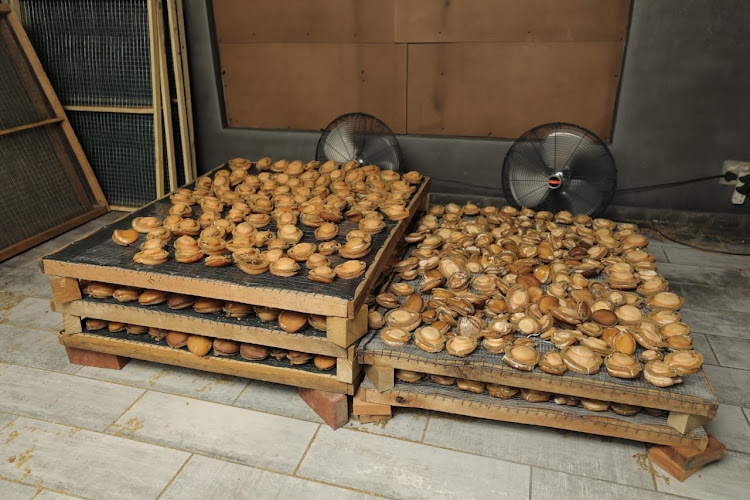
Image: SAPS
Abalone with an expected street value of R900,000 and abalone drying equipment valued at around R60,000 was found in a Stellenbosch house when law enforcement officers responded to a fire caused by a gas bottle explosion early on Wednesday.
Col Andrè Traut said the fire department and the police were on the scene just after midnight at a residence in Cynaroides Road, Paradyskloof.
“On arrival, the fire brigade was gaining access to the house to extinguish the blaze. The police conducted their investigation surrounding the circumstances of the incident when they came across a huge quantity of abalone.”
According to a homeowner in the street, the stench in the neighbourhood on Thursday was “absolutely horrendous”.
Traut said two men, aged 23 and 26, were arrested for the illegal possession of abalone, and the police are hunting for a Chinese man in whose name the property was leased.
“Once charged, the suspects are expected to make a court appearance in Stellenbosch.”
TimesLIVE
https://www.sowetanlive.co.za/news/sout ... llenbosch/
By TimesLIVE - 10 February 2021 - 12:23
Police got a lucky break when they bust an abalone operation due to a gas explosion. File photo.
Image: SAPS
Abalone with an expected street value of R900,000 and abalone drying equipment valued at around R60,000 was found in a Stellenbosch house when law enforcement officers responded to a fire caused by a gas bottle explosion early on Wednesday.
Col Andrè Traut said the fire department and the police were on the scene just after midnight at a residence in Cynaroides Road, Paradyskloof.
“On arrival, the fire brigade was gaining access to the house to extinguish the blaze. The police conducted their investigation surrounding the circumstances of the incident when they came across a huge quantity of abalone.”
According to a homeowner in the street, the stench in the neighbourhood on Thursday was “absolutely horrendous”.
Traut said two men, aged 23 and 26, were arrested for the illegal possession of abalone, and the police are hunting for a Chinese man in whose name the property was leased.
“Once charged, the suspects are expected to make a court appearance in Stellenbosch.”
TimesLIVE
https://www.sowetanlive.co.za/news/sout ... llenbosch/
Please check Needs Attention pre-booking: https://africawild-forum.com/viewtopic.php?f=322&t=596
- Lisbeth
- Site Admin
- Posts: 67582
- Joined: Sat May 19, 2012 12:31 pm
- Country: Switzerland
- Location: Lugano
- Contact:
Re: Abalone Poaching
A lucky break and a couple of poachers less, but the abalones are dead and gone 
"Education is the most powerful weapon which you can use to change the world." Nelson Mandela
The desire for equality must never exceed the demands of knowledge
The desire for equality must never exceed the demands of knowledge
- Richprins
- Committee Member
- Posts: 76104
- Joined: Sat May 19, 2012 3:52 pm
- Location: NELSPRUIT
- Contact:
Re: Abalone Poaching
65 'abalone poachers' bust in Table Mountain National Park this week
13 March 2021 - 09:51
Philani Nombembe Journalist
Some of the alleged abalone poachers who were arrested during a joint operation in February.
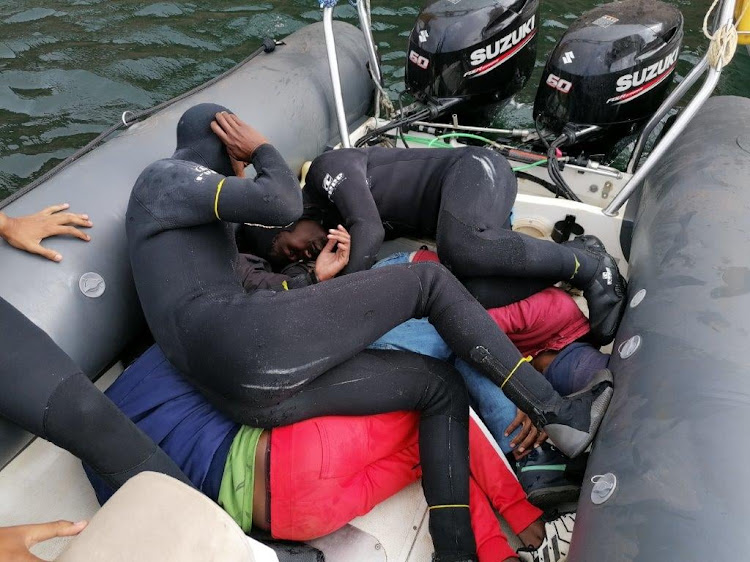
Image: Supplied
A joint operation between police, City of Cape Town law enforcement units and Table Mountain National Park (TMNP) rangers netted 65 abalone poachers this week.
According to TMNP manager Frans van Rooyen, the poachers were bust on Thursday night. Van Rooyen said the teams have been conducting daily sea patrols in the marine protected areas of the nature reserve “to fight against poaching that threatens the marine resources”.
Two other joint operations in January and February resulted in 23 arrests. One rubber duck was confiscated in January.
“We really appreciate the assistance and support we are getting from the City of Cape Town marine law enforcement unit and SAPS. Sharing of resources among law enforcement agencies is of paramount importance in tackling poaching, more especially in identified poaching hotspots areas. Working together we can achieve more,” said Van Rooyen.
TimesLIVE
https://www.sowetanlive.co.za/news/sout ... this-week/
13 March 2021 - 09:51
Philani Nombembe Journalist
Some of the alleged abalone poachers who were arrested during a joint operation in February.
Image: Supplied
A joint operation between police, City of Cape Town law enforcement units and Table Mountain National Park (TMNP) rangers netted 65 abalone poachers this week.
According to TMNP manager Frans van Rooyen, the poachers were bust on Thursday night. Van Rooyen said the teams have been conducting daily sea patrols in the marine protected areas of the nature reserve “to fight against poaching that threatens the marine resources”.
Two other joint operations in January and February resulted in 23 arrests. One rubber duck was confiscated in January.
“We really appreciate the assistance and support we are getting from the City of Cape Town marine law enforcement unit and SAPS. Sharing of resources among law enforcement agencies is of paramount importance in tackling poaching, more especially in identified poaching hotspots areas. Working together we can achieve more,” said Van Rooyen.
TimesLIVE
https://www.sowetanlive.co.za/news/sout ... this-week/
Please check Needs Attention pre-booking: https://africawild-forum.com/viewtopic.php?f=322&t=596
- Lisbeth
- Site Admin
- Posts: 67582
- Joined: Sat May 19, 2012 12:31 pm
- Country: Switzerland
- Location: Lugano
- Contact:
Re: Abalone Poaching
Luckily they have started taking this thing seriously.
Knowing it, you should have started years ago!!“to fight against poaching that threatens the marine resources”.
"Education is the most powerful weapon which you can use to change the world." Nelson Mandela
The desire for equality must never exceed the demands of knowledge
The desire for equality must never exceed the demands of knowledge
- Richprins
- Committee Member
- Posts: 76104
- Joined: Sat May 19, 2012 3:52 pm
- Location: NELSPRUIT
- Contact:
Re: Abalone Poaching
Two men bust for huge abalone haul, forfeit Land Rover to the state
13 March 2021 - 15:40
Philani Nombembe Journalist
Two men have entered into a plea and sentencing agreement after they were arrested for possession of R1.3m worth of abalone.
Two men were arrested over poached abalone worth R1.3m have admitted their crimes.
Muhammed Abdikadur Hussein, 28, and Yue Zuang Chen, 29, entered into a plea and sentencing agreement with the state. The were sentenced in the Khayelitsha priority court on Friday.
They faced charges related to the possession of abalone, contravention of the Immigration Act and contravening the Marine Living Resources Act.
According to Hawks spokesperson Zinzi Hani, Hussein was fined R100,000 and handed a 12-month prison sentence which was suspended for five years.
Chen was sentenced to 18 months in prison for contravention of the Marine Living Resources Act, nine of which were suspended. He was also handed a six-month sentence for being in SA illegally. The sentences will run concurrently.
“Therefore, Chen will effectively serve nine months' direct imprisonment. Additionally, the Land Rover that was seized and used to transport abalone is forfeited to the state,” said Hani.
TimesLIVE
https://www.sowetanlive.co.za/news/sout ... the-state/
13 March 2021 - 15:40
Philani Nombembe Journalist
Two men have entered into a plea and sentencing agreement after they were arrested for possession of R1.3m worth of abalone.
Two men were arrested over poached abalone worth R1.3m have admitted their crimes.
Muhammed Abdikadur Hussein, 28, and Yue Zuang Chen, 29, entered into a plea and sentencing agreement with the state. The were sentenced in the Khayelitsha priority court on Friday.
They faced charges related to the possession of abalone, contravention of the Immigration Act and contravening the Marine Living Resources Act.
According to Hawks spokesperson Zinzi Hani, Hussein was fined R100,000 and handed a 12-month prison sentence which was suspended for five years.
Chen was sentenced to 18 months in prison for contravention of the Marine Living Resources Act, nine of which were suspended. He was also handed a six-month sentence for being in SA illegally. The sentences will run concurrently.
“Therefore, Chen will effectively serve nine months' direct imprisonment. Additionally, the Land Rover that was seized and used to transport abalone is forfeited to the state,” said Hani.
TimesLIVE
https://www.sowetanlive.co.za/news/sout ... the-state/
Please check Needs Attention pre-booking: https://africawild-forum.com/viewtopic.php?f=322&t=596
- Lisbeth
- Site Admin
- Posts: 67582
- Joined: Sat May 19, 2012 12:31 pm
- Country: Switzerland
- Location: Lugano
- Contact:
Re: Abalone Poaching
At least we will not see these two around for some time 
"Education is the most powerful weapon which you can use to change the world." Nelson Mandela
The desire for equality must never exceed the demands of knowledge
The desire for equality must never exceed the demands of knowledge
- Lisbeth
- Site Admin
- Posts: 67582
- Joined: Sat May 19, 2012 12:31 pm
- Country: Switzerland
- Location: Lugano
- Contact:
Re: Abalone Poaching
The abalone connection: The ties that bind poaching and smuggling with the SA crystal meth industry
By Global Initiative Against Transnational Organized Crime• 2 May 2021
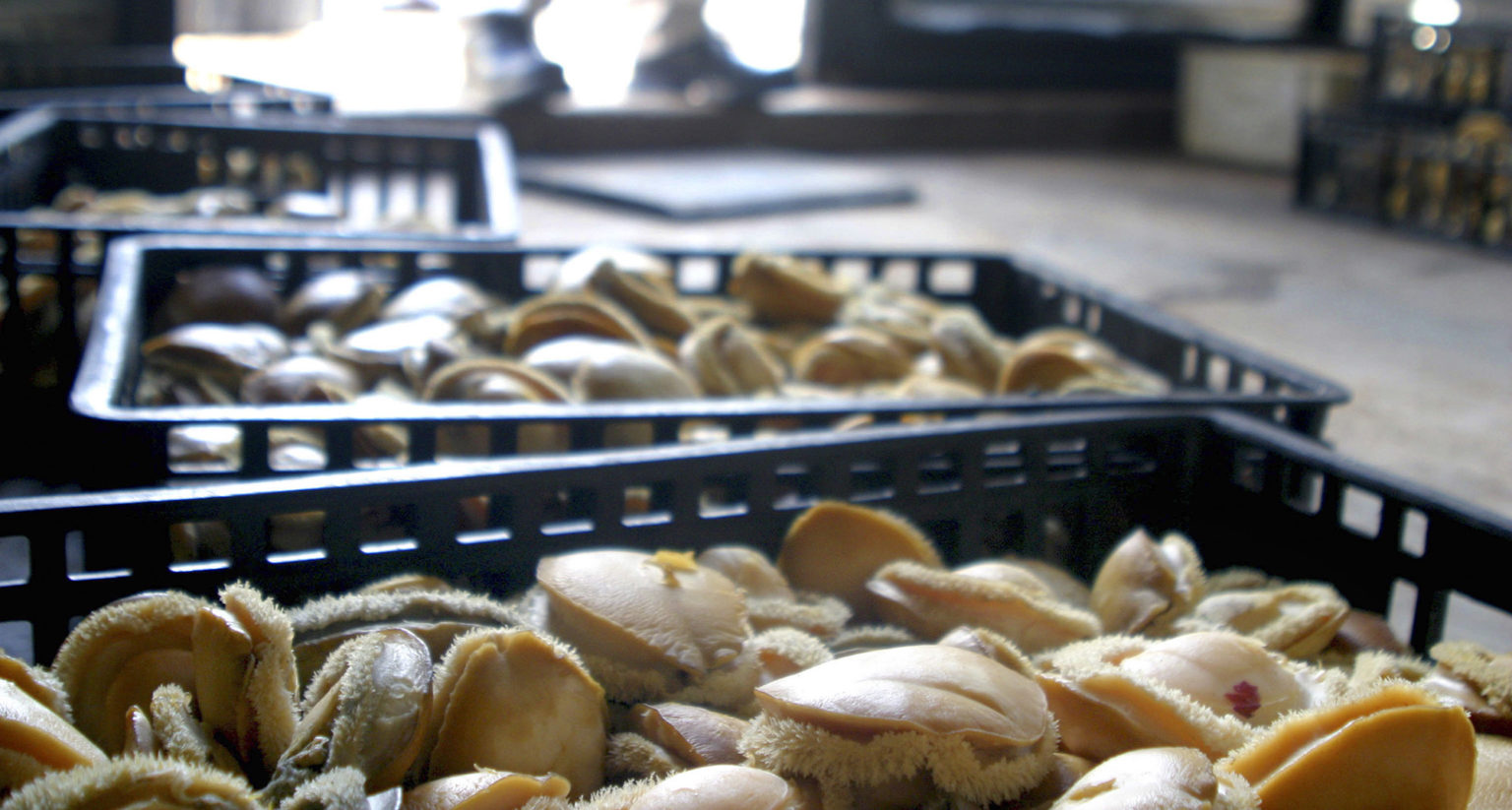
An abalone bust in Hammanskraal, South Africa, on 3 February 2004. (Photo: Gallo Images / Media 24)
The market in poached South African abalone (perlemoen) has been closely connected to the trafficking of synthetic drugs since the 1990s, when South African gangs began to barter abalone with Chinese organised crime groups for the precursors to methaqualone and methamphetamine. This connection evolved over the subsequent decades, contributing to widespread meth (tik) production and consumption in South Africa. Although poaching has decimated abalone populations and domestic meth production is declining, the two illicit markets still remain joined today.
It is one of the stranger quirks of crime history that a marine snail became one of the key drivers in the development of the South African synthetic drugs market from the 1990s onwards, as well as forming a lucrative illicit market in its own right. Over two decades, the illegal market for South African abalone (Haliotis midae, also known as perlemoen) has grown to the point where more than 2,000 tonnes are being poached from South African waters annually, according to 2018 estimates from wildlife monitoring group TRAFFIC.
The growth of this poached abalone market helped fuel the rise in the trafficking of synthetic drugs and their precursors to South Africa. Although much has changed since the 1990s, according to interviews with abalone poachers and middlemen, many of the same dynamics that established the abalone-synthetics connection still remain in place today.
The emergence of abalone poaching and the politics of fishing quotas
Large-scale abalone poaching is a relatively recent phenomenon in South Africa. Quotas restricting the maximum catch of species, including abalone, were introduced in South Africa in the late 1960s, but poaching remained at low levels for decades.
This began to change during South Africa’s democratic transition in the early 1990s. In an effort to transform the coastal fishing industry, the new post-apartheid government tried to create a more equitable licensing and catch quota scheme. As a result, enforcement efforts against poaching were significantly expanded, penalties were increased and special environmental courts were established to prosecute offenders.
The new policies had unintended consequences, favouring newcomer commercial fishing operators and further marginalising local operators who had relied on small-scale fishing for their livelihoods. As a result, poaching increased.
The changes also delegitimised the efforts of state authorities in the eyes of coastal Cape communities. Illicit catches of abalone and crayfish (rock lobster) grew as fishers undertook to operate outside the confines of a system they saw as being both corrupt and prejudiced.
Access to marine resources (including abalone) as dictated by the fishing quotas remains a deeply political issue today. Those who poach and transport abalone often point to the limitations on the legal market as the reason they feel forced into the illegal trade.
“The quotas forced people to go and dive for perlemoen and it’s unfair, because it makes an honest man trying to provide for his family into a criminal who is now smokkeling [illegally trafficking] with perlemoen,” said Junaid, a 53-year-old transporter of abalone in the Cape Agulhas area in the Western Cape, who is also a former diver for abalone. (Names of interviewees have been changed.)
Granwil, a fisherman and gang member in Hawston, on the Western Cape coast, agreed. “The government is forcing the fishermen and the communities into illegal trade… they sell our shores to China and to other fishing countries and as a result they reduced our quotas… obviously then, we are forced to mine for abalone illegally at night or any time.”
The development of the meth-abalone connection
In the space of a few years in the 1990s, the poaching of abalone became a lucrative, organised criminal enterprise, with Cape gangs moving in to dominate what had become a multimillion-dollar illicit trade. Gang control of the trade continues today. Ernie “Lastig” Solomon, the late leader of the Terrible Josters street gang, was a prominent figure in the Western Cape abalone trade in recent years, monopolising the trade along a large swathe of coastline until his assassination in November 2020. This has reportedly left a power vacuum in the market and led to competition between different underworld figures for Solomon’s position.
Darryl, an abalone smuggler in Hawston, which was Solomon’s territory, said: “Ernie Lastig played a big part in the fishing industry, because he regulated it in a way that the government didn’t.” Darryl viewed Solomon’s thuggery almost as a necessary evil. “Ernie Lastig was like a warm beer, in that it doesn’t taste that good, but at least it’s still a beer… Ernie taxed us on perlemoen and crayfish, but he also protected the community from other unscrupulous gangsters that would have caused a lot of havoc here for us.”
Chinese syndicates, which had been embedded in the country since at least the early 1970s, became the dominant buyers for illegally harvested abalone from Cape gangs. The abalone, so easily harvested and acquired by the Cape gangs, was a high-priced Asian delicacy that could be smuggled out along existing routes in neighbouring countries and sold by the Chinese syndicates at a significant profit in Hong Kong.
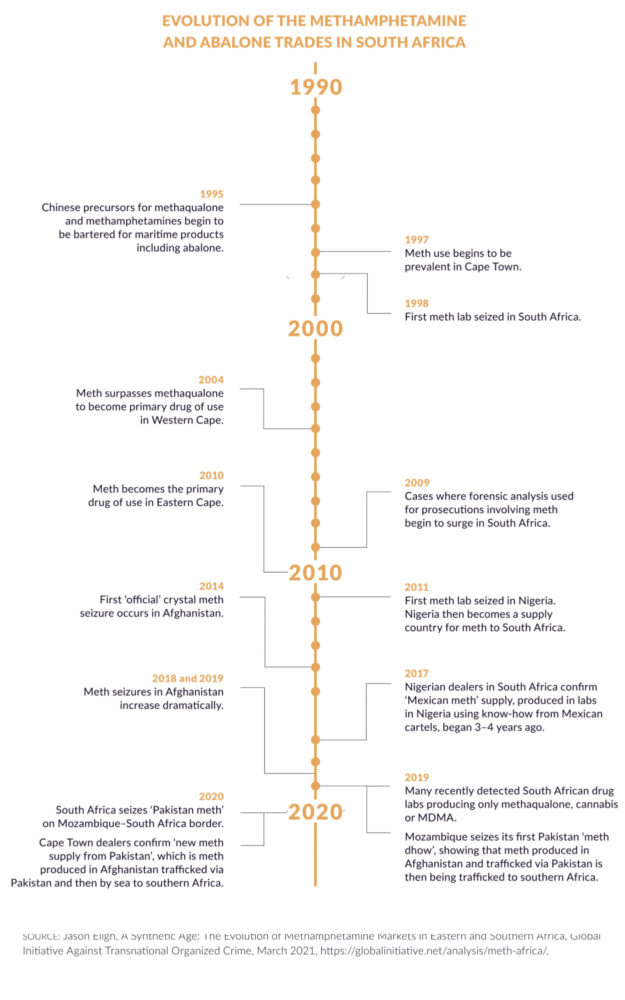
Timeline of the evolution of the meth and abalone trades in South Africa. (Source: Jason Eligh, A Synthetic Age: The Evolution of Methamphetamine Markets in Eastern and Southern Africa, Global Initiative Against Transnational Organized Crime, March 2021, https://globalinitiative.net/analysis/meth-africa/)
A barter economy arose between the gangs and their Chinese buyers, eliminating the need for exchanges of large amounts of cash. Chinese syndicates traded the precursor chemicals necessary to produce methaqualone in return for abalone from the Cape gangs. Commonly known as “Mandrax” in South Africa, or Quaalude or “ludes” in North America and Europe, methaqualone has a long history of use in South Africa.
Subsequently, the Chinese networks also bartered with precursors for crystal methamphetamine, which is commonly known as “tik”. These chemicals – difficult and expensive to obtain in South Africa – were unregulated in China, and easily and cheaply obtained by the Chinese gangs.
It was a mutually beneficial arrangement that contributed to the expansion of methaqualone in South Africa as well as the introduction of domestic methamphetamine production, which was first documented in South Africa in the late 1990s. Domestic production and use quickly expanded alongside the growth in the illicit trade in abalone and precursors between South African gangs and Chinese organised criminal groups. In March 1998, a Chinese shipment containing 20 tons of ephedrine (a meth precursor) bound for South Africa was seized by Chinese law enforcement authorities. In the previous year the total amount of ephedrine seized globally was only 8 tonnes. This seizure was significant – 20 tonnes of ephedrine could have produced a staggering 13 tonnes of methamphetamine – and showed that industrial production of South African meth had begun.
By 2005, meth had become the primary substance of use among all people who use drugs in the Western Cape province, surpassing methaqualone, cannabis and even alcohol, according to reporting from the South African Community Epidemiology Network on Drug Use (SACENDU). Today meth is the primary substance of use in the Western and Eastern Cape provinces, the secondary substance of use in the Northern Cape, North West and Free State provinces, and the third most commonly used substance in the rest of the country.
The meth and abalone market today
The South African methamphetamine market of today is very different to its early years. Domestic production now appears to be in decline, and much is sourced from Nigerian syndicates producing methamphetamines in Nigeria, with assistance from Mexican cartels. A new supply chain has also now emerged transporting Afghan-produced methamphetamine via routes used for many years to traffic heroin to east and southern Africa.
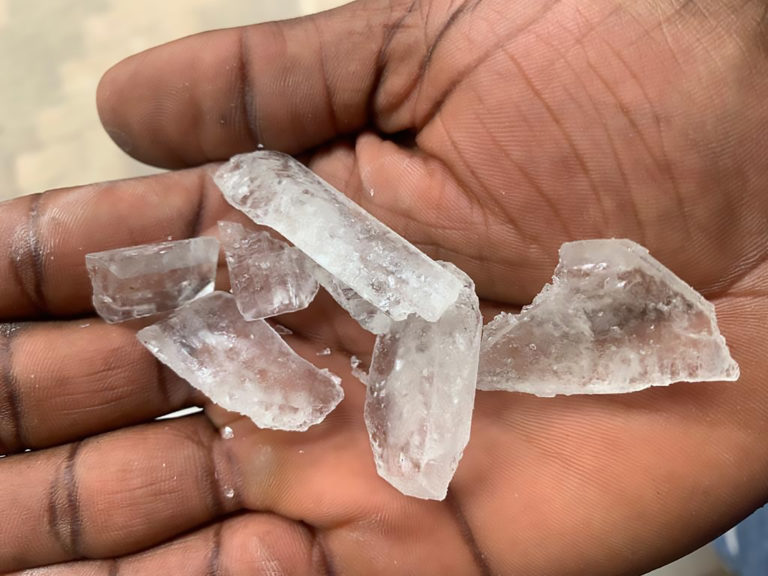
A sample of crystal meth on sale in Cape Town. This is the type of meth known in South Africa as ‘Pakistani meth’, imported from Afghanistan via Pakistan. (Source: GI-TOC)
However, the barter system whereby abalone is traded for drugs or their precursors still persists. Several poachers and smugglers interviewed confirmed the trade is ongoing. Junaid, the abalone transporter, put it this way: “They [the Chinese networks] have the gold that the gangsters want and that gold is drugs… in that type of exchange, it’s one trading gold for another’s gold, perlemoen is gold to Chinese and drugs is gold to gangsters who have drying facilities.”
Other abalone smugglers said that today the Chinese do not only offer drugs and precursors in this barter system. Darryl, the abalone smuggler in Hawston, said property can become part of the deal. “I know of a couple times that rich Chinese customers would buy a house and put it in your name just so they can get abalone from you for five years without any trouble,” he said.
Denver, a 56-year-old boss in the Terrible Josters gang, agreed that properties sometimes formed part of abalone deals with Chinese groups. He also claimed that abalone is sometimes exchanged for the service of hitmen in the Chinese groups’ employ. However, it was not possible to verify this claim from other sources.
Samantha, a 60-year-old drug dealer and abalone smuggler, described how Chinese buyers can become involved at different stages of the abalone trade. Some approached the divers to source abalone directly in exchange for tik and precursors (which the divers, in turn, sell to gangs) and set up their own facilities to dry the abalone before exporting. Others, she said, source abalone from gang-controlled drying facilities.
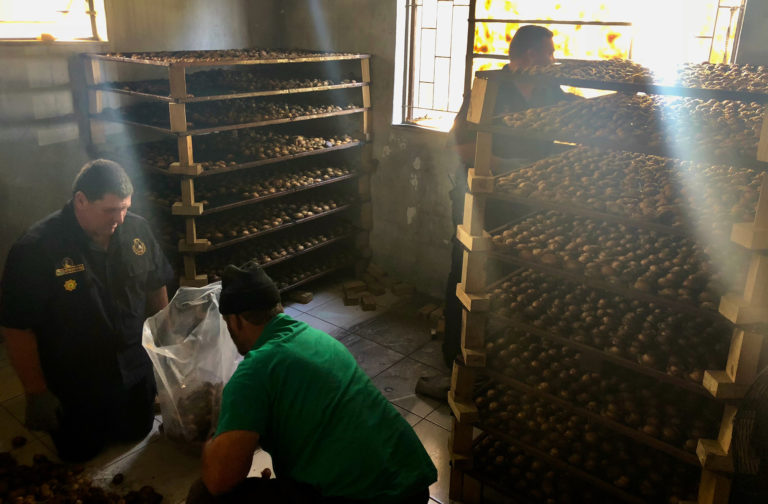
Police raid an abalone-drying facility in Soshanguve, north of Pretoria, on 20 January 2018. (Photo: Julian Rademeyer)
All poachers and smugglers interviewed agreed that the wheels of the trade are greased by widespread corruption. Franklin, a senior member of the 28s gang, said that “we must pay a lot of people so that the shipment reaches its destination and that will include wildlife people, obviously police and sometimes politicians as well that can clear the way for our shipment to get where it’s going… corruption works good here in the Western Cape”.
The South African meth market has gone through many changes since the 1990s: new international streams of supply have emerged, use has become widespread across the country and domestic meth production has declined. Despite these changes, the illicit markets in abalone and meth have continued their unlikely symbiotic relationship. DM
This article draws on research from a new GI-TOC research report which presents new analysis of the extent of the meth market in east and southern Africa. Available at: https://globalinitiative.net/analysis/meth-africa/. This article also appears in the Global Initiative Against Transnational Organized Crime’s monthly East and Southern Africa Risk Bulletin. The Global Initiative is a network of more than 500 experts on organised crime drawn from law enforcement, academia, conservation, technology, media, the private sector and development agencies. It publishes research and analysis on emerging criminal threats and works to develop innovative strategies to counter organised crime globally.
By Global Initiative Against Transnational Organized Crime• 2 May 2021

An abalone bust in Hammanskraal, South Africa, on 3 February 2004. (Photo: Gallo Images / Media 24)
The market in poached South African abalone (perlemoen) has been closely connected to the trafficking of synthetic drugs since the 1990s, when South African gangs began to barter abalone with Chinese organised crime groups for the precursors to methaqualone and methamphetamine. This connection evolved over the subsequent decades, contributing to widespread meth (tik) production and consumption in South Africa. Although poaching has decimated abalone populations and domestic meth production is declining, the two illicit markets still remain joined today.
It is one of the stranger quirks of crime history that a marine snail became one of the key drivers in the development of the South African synthetic drugs market from the 1990s onwards, as well as forming a lucrative illicit market in its own right. Over two decades, the illegal market for South African abalone (Haliotis midae, also known as perlemoen) has grown to the point where more than 2,000 tonnes are being poached from South African waters annually, according to 2018 estimates from wildlife monitoring group TRAFFIC.
The growth of this poached abalone market helped fuel the rise in the trafficking of synthetic drugs and their precursors to South Africa. Although much has changed since the 1990s, according to interviews with abalone poachers and middlemen, many of the same dynamics that established the abalone-synthetics connection still remain in place today.
The emergence of abalone poaching and the politics of fishing quotas
Large-scale abalone poaching is a relatively recent phenomenon in South Africa. Quotas restricting the maximum catch of species, including abalone, were introduced in South Africa in the late 1960s, but poaching remained at low levels for decades.
This began to change during South Africa’s democratic transition in the early 1990s. In an effort to transform the coastal fishing industry, the new post-apartheid government tried to create a more equitable licensing and catch quota scheme. As a result, enforcement efforts against poaching were significantly expanded, penalties were increased and special environmental courts were established to prosecute offenders.
The new policies had unintended consequences, favouring newcomer commercial fishing operators and further marginalising local operators who had relied on small-scale fishing for their livelihoods. As a result, poaching increased.
The changes also delegitimised the efforts of state authorities in the eyes of coastal Cape communities. Illicit catches of abalone and crayfish (rock lobster) grew as fishers undertook to operate outside the confines of a system they saw as being both corrupt and prejudiced.
Access to marine resources (including abalone) as dictated by the fishing quotas remains a deeply political issue today. Those who poach and transport abalone often point to the limitations on the legal market as the reason they feel forced into the illegal trade.
“The quotas forced people to go and dive for perlemoen and it’s unfair, because it makes an honest man trying to provide for his family into a criminal who is now smokkeling [illegally trafficking] with perlemoen,” said Junaid, a 53-year-old transporter of abalone in the Cape Agulhas area in the Western Cape, who is also a former diver for abalone. (Names of interviewees have been changed.)
Granwil, a fisherman and gang member in Hawston, on the Western Cape coast, agreed. “The government is forcing the fishermen and the communities into illegal trade… they sell our shores to China and to other fishing countries and as a result they reduced our quotas… obviously then, we are forced to mine for abalone illegally at night or any time.”
The development of the meth-abalone connection
In the space of a few years in the 1990s, the poaching of abalone became a lucrative, organised criminal enterprise, with Cape gangs moving in to dominate what had become a multimillion-dollar illicit trade. Gang control of the trade continues today. Ernie “Lastig” Solomon, the late leader of the Terrible Josters street gang, was a prominent figure in the Western Cape abalone trade in recent years, monopolising the trade along a large swathe of coastline until his assassination in November 2020. This has reportedly left a power vacuum in the market and led to competition between different underworld figures for Solomon’s position.
Darryl, an abalone smuggler in Hawston, which was Solomon’s territory, said: “Ernie Lastig played a big part in the fishing industry, because he regulated it in a way that the government didn’t.” Darryl viewed Solomon’s thuggery almost as a necessary evil. “Ernie Lastig was like a warm beer, in that it doesn’t taste that good, but at least it’s still a beer… Ernie taxed us on perlemoen and crayfish, but he also protected the community from other unscrupulous gangsters that would have caused a lot of havoc here for us.”
Chinese syndicates, which had been embedded in the country since at least the early 1970s, became the dominant buyers for illegally harvested abalone from Cape gangs. The abalone, so easily harvested and acquired by the Cape gangs, was a high-priced Asian delicacy that could be smuggled out along existing routes in neighbouring countries and sold by the Chinese syndicates at a significant profit in Hong Kong.

Timeline of the evolution of the meth and abalone trades in South Africa. (Source: Jason Eligh, A Synthetic Age: The Evolution of Methamphetamine Markets in Eastern and Southern Africa, Global Initiative Against Transnational Organized Crime, March 2021, https://globalinitiative.net/analysis/meth-africa/)
A barter economy arose between the gangs and their Chinese buyers, eliminating the need for exchanges of large amounts of cash. Chinese syndicates traded the precursor chemicals necessary to produce methaqualone in return for abalone from the Cape gangs. Commonly known as “Mandrax” in South Africa, or Quaalude or “ludes” in North America and Europe, methaqualone has a long history of use in South Africa.
Subsequently, the Chinese networks also bartered with precursors for crystal methamphetamine, which is commonly known as “tik”. These chemicals – difficult and expensive to obtain in South Africa – were unregulated in China, and easily and cheaply obtained by the Chinese gangs.
It was a mutually beneficial arrangement that contributed to the expansion of methaqualone in South Africa as well as the introduction of domestic methamphetamine production, which was first documented in South Africa in the late 1990s. Domestic production and use quickly expanded alongside the growth in the illicit trade in abalone and precursors between South African gangs and Chinese organised criminal groups. In March 1998, a Chinese shipment containing 20 tons of ephedrine (a meth precursor) bound for South Africa was seized by Chinese law enforcement authorities. In the previous year the total amount of ephedrine seized globally was only 8 tonnes. This seizure was significant – 20 tonnes of ephedrine could have produced a staggering 13 tonnes of methamphetamine – and showed that industrial production of South African meth had begun.
By 2005, meth had become the primary substance of use among all people who use drugs in the Western Cape province, surpassing methaqualone, cannabis and even alcohol, according to reporting from the South African Community Epidemiology Network on Drug Use (SACENDU). Today meth is the primary substance of use in the Western and Eastern Cape provinces, the secondary substance of use in the Northern Cape, North West and Free State provinces, and the third most commonly used substance in the rest of the country.
The meth and abalone market today
The South African methamphetamine market of today is very different to its early years. Domestic production now appears to be in decline, and much is sourced from Nigerian syndicates producing methamphetamines in Nigeria, with assistance from Mexican cartels. A new supply chain has also now emerged transporting Afghan-produced methamphetamine via routes used for many years to traffic heroin to east and southern Africa.

A sample of crystal meth on sale in Cape Town. This is the type of meth known in South Africa as ‘Pakistani meth’, imported from Afghanistan via Pakistan. (Source: GI-TOC)
However, the barter system whereby abalone is traded for drugs or their precursors still persists. Several poachers and smugglers interviewed confirmed the trade is ongoing. Junaid, the abalone transporter, put it this way: “They [the Chinese networks] have the gold that the gangsters want and that gold is drugs… in that type of exchange, it’s one trading gold for another’s gold, perlemoen is gold to Chinese and drugs is gold to gangsters who have drying facilities.”
Other abalone smugglers said that today the Chinese do not only offer drugs and precursors in this barter system. Darryl, the abalone smuggler in Hawston, said property can become part of the deal. “I know of a couple times that rich Chinese customers would buy a house and put it in your name just so they can get abalone from you for five years without any trouble,” he said.
Denver, a 56-year-old boss in the Terrible Josters gang, agreed that properties sometimes formed part of abalone deals with Chinese groups. He also claimed that abalone is sometimes exchanged for the service of hitmen in the Chinese groups’ employ. However, it was not possible to verify this claim from other sources.
Samantha, a 60-year-old drug dealer and abalone smuggler, described how Chinese buyers can become involved at different stages of the abalone trade. Some approached the divers to source abalone directly in exchange for tik and precursors (which the divers, in turn, sell to gangs) and set up their own facilities to dry the abalone before exporting. Others, she said, source abalone from gang-controlled drying facilities.

Police raid an abalone-drying facility in Soshanguve, north of Pretoria, on 20 January 2018. (Photo: Julian Rademeyer)
All poachers and smugglers interviewed agreed that the wheels of the trade are greased by widespread corruption. Franklin, a senior member of the 28s gang, said that “we must pay a lot of people so that the shipment reaches its destination and that will include wildlife people, obviously police and sometimes politicians as well that can clear the way for our shipment to get where it’s going… corruption works good here in the Western Cape”.
The South African meth market has gone through many changes since the 1990s: new international streams of supply have emerged, use has become widespread across the country and domestic meth production has declined. Despite these changes, the illicit markets in abalone and meth have continued their unlikely symbiotic relationship. DM
This article draws on research from a new GI-TOC research report which presents new analysis of the extent of the meth market in east and southern Africa. Available at: https://globalinitiative.net/analysis/meth-africa/. This article also appears in the Global Initiative Against Transnational Organized Crime’s monthly East and Southern Africa Risk Bulletin. The Global Initiative is a network of more than 500 experts on organised crime drawn from law enforcement, academia, conservation, technology, media, the private sector and development agencies. It publishes research and analysis on emerging criminal threats and works to develop innovative strategies to counter organised crime globally.
"Education is the most powerful weapon which you can use to change the world." Nelson Mandela
The desire for equality must never exceed the demands of knowledge
The desire for equality must never exceed the demands of knowledge
- Richprins
- Committee Member
- Posts: 76104
- Joined: Sat May 19, 2012 3:52 pm
- Location: NELSPRUIT
- Contact:
Re: Abalone Poaching
Crazy! 
Please check Needs Attention pre-booking: https://africawild-forum.com/viewtopic.php?f=322&t=596


